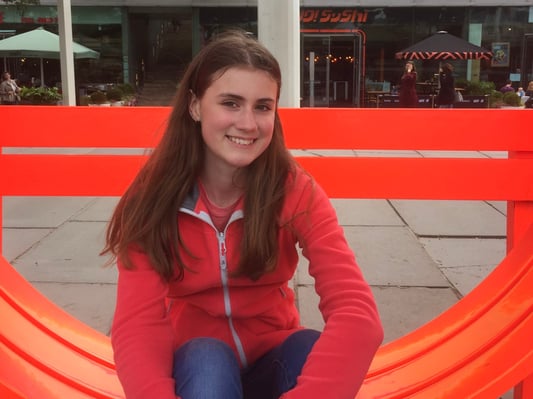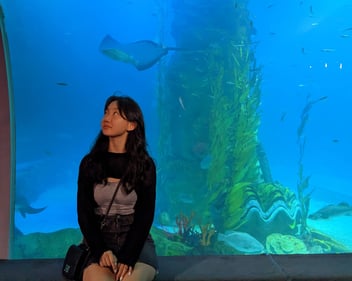For Elena Canty (Australia), Best Peer Review winner for our Environmental Journalism Competition, expert feedback is made up of layers—small grammar fixes, then line edits, then feedback on the overall flow and ideas of the piece. But before each tier can be added, the reviewer must lay a strong foundation—reading the piece again and again until, as Elena says, “the ideas behind it really sink in.”
In this interview, we talk more about her expert approach to peer reviewing as well as her YA and sci-fi reading recommendations.

What was your process for reviewing “A Simple Travesty”?
I approach giving feedback in layers. The first step is finding any easily fixable mistakes—errors in spelling, grammar, punctuation, and things like that. The first time I read through a piece I’m reviewing, I don’t highlight anything except those mistakes. I’m one of those people that points out typos in everything, so I can’t help myself! Then, I read through it again. This time, I work on sentences instead of individual words. I highlight lines that I love, and make suggestions to rephrase any that don’t flow so well or are unclear for the reader. Finally, I make comments on larger sections of the piece, such as a paragraph, a character, or, in this case, the arguments made by the author. I’ve found that this sort of “layered” approach is usually the most logical and effective way for me to provide feedback on anything!
Your review was praised for offering both feedback on the piece as a whole and “targeted suggestions on syntax, diction, and grammar.” Do you have tips for other writers on how to balance reviewing both the big picture and the details?
I’m really glad that those things came across in my review, because whenever I offer feedback I aim for that balance of big picture suggestions and smaller things like grammar and syntax.
If you have trouble spotting typos or clunky wording, a tip for fixing things like that is to read the piece aloud. Your ear is a great editor.
A simple yet underrated way to understand the big picture or overall message of a piece is to read it. Then read it again. And again. Read it until the ideas behind it really sink in. I generally find that every time I reread a piece, I discover new things about it that I enjoy, or notice parts of it that could be improved.
As for balancing the two, I use the highlighting tool to point out individual parts of a piece while also writing detailed answers to the questions provided, focusing on overall themes. If you do both of these things, you should have a good balance of large and small suggestions.
How does editing others’ work help inform your own work as a writer?
Editing others’ work helps me build my understanding of what makes a good piece of writing. It’s great for discovering elements that I want to incorporate into my own work, as well as learning to spot things that aren’t as effective. It also improves my editing skills when it comes to revising my own pieces. I really enjoy reviewing others’ work, and it’s a great way of improving my own writing too.
What are your book recommendations for the Write the World community?
I absolutely love YA fantasy and science fiction novels. In particular, I find dystopian stories fascinating. It’s interesting to read exciting stories set in one person’s interpretation of what our world could become. These stories are even more relevant to us now, as we face the climate crisis. Scott Westerfeld has written plenty of amazing sci-fi and fantasy novels, and I recommend his dystopian series Uglies. If you’re looking for great fantasy novels, I recommend Whisper by Lynette Noni and the Red Queen series by Victoria Aveyard.





